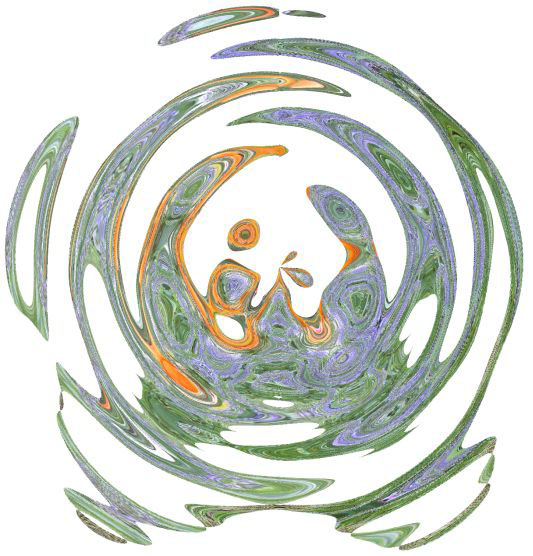

Flower Abstract
Art by Norman E. Masters
"I have to add to the concern of holy wars, that Hindus have joined the insanity. There are Pakistan Hindus, but Indian Hindus seem to think of Pakistan as mostly Moslem. I am troubled by the spread of troubles involving Moslems. The Moslems and Palestinians I know, are gentle people. The Hindu I just met is not of the war spirit, but also a gentle soul. I do not understand what is happening, but I am busy saying uplifting things to all of them." ~~ Carol Seaton
~~ from BENAZIR BHUTTO, deposed feminine Prime Minister of Pakistan, elected both times the elections were truly *free*:
I believe there are four simultaneous challenges that the world faces today. First, the rise of ethnic and religious hatred, prejudice and intolerance. Second, the gulf of wealth and health emerging between the developed and developing countries, and within nations themselves. Third, the growing sense of alienation by the people in a complex and fast-moving world and the ability of their governments to resolve the problem that the new technology era faces. And, fourth, the continuing gender inequity in all societies, west as well as east, that creates social division in the society as we move towards a new century.
So, we muse on the lessons of history and the lessons of human nature. While many in the West believe that there is no place for democracy in Islam, given the few number of democratic Muslim states, Muslims, on the other hand, believe that democracy is inherent in our faith. In Islam, dictatorship is never condoned. Dictatorship is considered a usurpation of the power of the people. Muslims are exalted to fight tyranny where ever they see it; and, indeed, Muslims are told that if you do not have the strength to fight tyranny when you see it, go into exile. But do not stand silent in the face of tyranny. For to be silent in the face of tyranny is to condone tyranny.
There are four democratic principles at the heart of Islam. The first is consultation, or Shura ; then, consensus, or Ijma ; and finally independent judgment, or Ijdaha. Instead of Islam being incompatible with democracy, our holy book makes it clear that the principle operations of the democratic process: consultation between the elected officials and the people; accountability of leaders to the people they serve, are fundamental to Islam. The holy book says that Islamic society is contingent on mutual advice, through mutual discussions, on an equal footing. Let me repeat that now: Equal footing. Ladies and gentleman, the Holy Koran is as committed to equality as it is to democracy. As committed to pluralism and tolerance as it is to order and doctrine. I know this is inconsistent with Western stereotypes. But, nevertheless, it is true. Consultation under the Holy Koran demands that public decisions are made by representative personalities. By men and by women who enjoy the confidence of the people and the integrity of their own character. Consensus provides a basis for majority rule. And, according to the Muslim scholar Luis Saffie , the legitimacy of the state depends upon the extent to which state organization and power reflect the will of the Omar , or the people.
But, the twenty-first century must be a century of moral universality; not selectivity. It is time for the West to understand that colonialism and exploitation, both of a material and spiritual kind, are over.
And, we Muslims, must live by the true spirit of Islam. Not just by its rituals. To those who would claim to speak for Islam, but would deny to our women a place in society, I say the ethos of Islam is equality. Equality between the sexes. There is no religion that, in its writings and its teachings, is more respectful for the role of women in society than Islam.
To those in the West who would condemn Islam for being anti-women, let me as the first Muslim woman elected Prime Minister of her country recall that three Muslim countries: Pakistan, Bangladesh, and Turkey have all had democratically elected women as head of their government.
There are many problems that we confront simultaneously. The Islamic extremists who burn books and keep young women in purdha are really not that different from the Christian fundamentalists who attack clinics in America or the Jewish extremists who massacre worshippers in Hebron. So, let us decide to cast aside myths and stereotypes about each other. For Islam and for the West, it is time to attack the common and real enemies of our respective societies. These enemies are not people; they are ignorance and hatred. These enemies are not ethnic minorities; they are starvation and intolerance. Myopia and prejudice, whether it be religious, political, ethnic, gender or intellectual, are the common enemies of our hope for the twenty-first century. They are the fuel of the clash of civilization.
Will we be prisoners of the mindset of the past? Or, will we be liberated to the endless possibilities of an historic future?
...my vision. For I see a third millennium where the gap between the rich and the poor states evaporates. Where illiteracy and hunger and malnutrition are conquered. I see where human rights are universal. I see a third millennium where civil dialogue is restored. I see a third millennium where people's trust in government and in themselves is restored. I see a third millennium of tolerance where religions respect other religions. I see a third millennium where every child is planned, wanted, nurtured and supported. I see a third millennium where the birth of a girl child is welcomed with the same joy as the birth of a boy.
The *entirety* of her speech is here:
http://www.top-education.com/Speeches/benazirbhutto.htm
 |
 |
 |